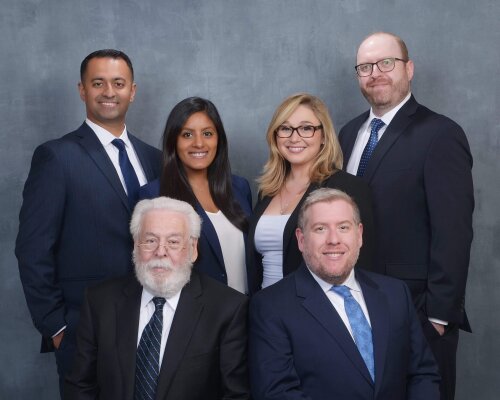Best Brain Injury Lawyers in Philadelphia
Share your needs with us, get contacted by law firms.
Free. Takes 2 min.
List of the best lawyers in Philadelphia, United States
About Brain Injury Law in Philadelphia, United States
Brain injuries range from mild concussions to severe traumatic brain injuries that cause long-term disability. In Philadelphia, Pennsylvania, legal claims involving brain injury commonly arise after car crashes, workplace accidents, falls, assaults, sports injuries, medical errors, and defective products. The legal process combines medical evidence, insurance law, and civil procedure under Pennsylvania and local Philadelphia rules. Victims and families often pursue compensation for medical care, lost income, long-term care, rehabilitation, and non-economic losses such as pain and suffering and loss of enjoyment of life.
Why You May Need a Lawyer
A brain injury can change life expectations overnight. Legal help is often needed because brain-injury cases are medically and legally complex. Common situations where people require a lawyer include:
- Serious motor vehicle collisions with head injuries where insurance companies dispute fault or damages.
- Workplace brain injuries where worker-s compensation covers some losses but additional third-party claims may be available.
- Medical malpractice claims after delayed diagnosis, surgical error, or other medical care that causes or worsens a brain injury.
- Slip and fall or premises-liability incidents where property owners may be responsible for hazardous conditions that caused a head injury.
- Assault-related brain injuries that involve criminal prosecution plus a separate civil claim for damages.
A lawyer helps preserve evidence, work with medical experts to explain injuries and prognosis, navigate insurance procedures, meet filing deadlines, and negotiate or litigate for fair compensation.
Local Laws Overview
Key legal considerations specific to Philadelphia and Pennsylvania include the following:
- Statute of limitations - Most personal-injury claims in Pennsylvania must be filed within two years of the date of the injury. Missing the deadline can bar recovery. Some categories of claims, such as certain medical-malpractice or government-entity claims, have different or additional timing rules. Contact an attorney promptly to confirm applicable deadlines.
- Comparative-fault rules - Pennsylvania follows a comparative-fault approach, which means a jury or judge reduces a plaintiff s recovery by the plaintiff s share of fault. The allocation of fault can dramatically affect recovery in a brain-injury case.
- Workers compensation - If a brain injury happens at work, workers compensation provides medical benefits and partial wage replacement. Workers compensation is often the exclusive remedy against an employer, but you may have a third-party claim against another responsible actor such as a contractor or vehicle driver.
- Medical-malpractice procedure - Malpractice claims have special procedural requirements, including expert-certification and affidavit rules and shorter filing timeframes in some situations. Medical-malpractice claims also frequently require expert opinions to show a breach of the standard of care.
- Government and public-entity claims - Claims against city agencies, municipal entities, or state actors often require a pre-suit notice or have different statutes of limitations and immunities. These notice requirements are strict and missing them can prevent recovery.
- Damages and remedies - Injured plaintiffs can seek economic damages such as past and future medical costs, lost wages, and rehabilitation expenses, and non-economic damages such as pain and suffering. Available remedies and caps can differ by the type of claim and defendant.
- Court venue and local practice - Philadelphia Court of Common Pleas handles many civil personal-injury lawsuits in the city. Local practice rules and procedures, including discovery schedules and mediation programs, influence how cases progress.
Frequently Asked Questions
What counts as a brain injury under the law?
Legally, a brain injury is any harm to the brain resulting in altered brain function. That includes traumatic brain injuries caused by external force and acquired brain injuries from medical events or lack of oxygen. The legal significance depends on medical documentation showing diagnosis, symptoms, and functional impairment.
How do I prove a brain-injury claim in Philadelphia?
Proving a claim requires medical records, diagnostic imaging, neurocognitive testing, eyewitness statements, incident reports, and often testimony from medical experts such as neurologists, neuropsychologists, and rehabilitation specialists. Establishing causation, the injury s severity, and the expected future needs is essential for full compensation.
What is the statute of limitations for brain-injury claims in Pennsylvania?
Most personal-injury claims must be filed within two years from the date of the injury. Some claims, such as certain medical-malpractice or government claims, may have different deadlines or notice requirements. Because timelines vary by claim type, consult an attorney right away to preserve your rights.
Do I need a lawyer if the other side s insurer offers a quick settlement?
Insurance companies may offer early settlements that are lower than fair value, especially for complex, long-term conditions like brain injury. An attorney evaluates future medical and care needs, loss of earning capacity, and non-economic damages and can advise whether an offer is reasonable. Lawyers also negotiate and, if needed, litigate to seek higher compensation.
What happens if my brain injury happened at work?
If a brain injury occurs at work, report it to your employer immediately and seek medical treatment. File a workers-compensation claim to obtain medical coverage and wage benefits. Because workers compensation may not cover all losses, speak with a lawyer about possible third-party claims against negligent contractors, drivers, or equipment manufacturers.
Can I sue for brain injury after medical treatment?
Yes, if negligent medical care caused or worsened a brain injury, you may have a medical-malpractice claim. Malpractice cases require expert medical opinions to show the standard of care was breached and that the breach caused harm. These claims have procedural nuances and often require prompt action and specialized counsel.
What if the injured person is a child or an incapacitated adult?
Special rules protect minors and incapacitated adults. Guardians or parents may need to file claims on their behalf. Courts often must approve settlements for minors or conservatees to ensure funds are used for the injured person s benefit. Discuss timing, representation, and settlement approval with an attorney experienced in such cases.
How long does it take to resolve a brain-injury case?
Timelines vary widely. Some cases settle in months, while complex cases with significant disability, disputed liability, or ongoing medical needs can take years to resolve through litigation. Many attorneys pursue interim or structured settlements to provide immediate resources while complex issues are finalized.
How are damages calculated in a brain-injury case?
Damages include past and future medical expenses, rehabilitation, home modification and assistive devices, lost earnings and future earning capacity, and non-economic losses such as pain and suffering. Calculating future needs requires expert testimony from medical and vocational specialists. Structured settlements may be used for long-term care funding.
What should I bring to a consultation with a brain-injury lawyer?
Bring copies of medical records, imaging reports, employer injury reports, police or incident reports, insurance information, photographs of the scene or injuries, contact information for witnesses, and any correspondence with insurers. If you do not have records, bring as much detail as you can about how the injury occurred and treatment received.
Additional Resources
For guidance and support, consider these local and national resources and agencies that assist brain-injury survivors and families:
- Brain-injury advocacy and support organizations offering education, peer support, and referrals for medical and legal assistance.
- Pennsylvania Department of Health and local Philadelphia public-health offices for medical and community-resources information.
- Philadelphia Court of Common Pleas information offices for civil-court procedures and filing requirements.
- Pennsylvania Department of Labor and Industry for workers-compensation information and claim assistance.
- Social Security Administration for potential disability benefits based on severe, long-term impairment.
- Local hospitals and rehabilitation centers that specialize in brain-injury care and can provide medical documentation and expert referrals.
Next Steps
If you or a loved one has sustained a brain injury in Philadelphia, take these practical steps:
- Seek immediate and ongoing medical care and follow treatment plans. Medical records are the foundation of any legal claim.
- Preserve evidence. Keep accident reports, photos, witness contact information, and records of missed work and expenses.
- Report workplace injuries to your employer promptly and comply with workers-compensation notice and claim procedures.
- Do not sign releases or accept settlement offers without consulting an attorney experienced in brain-injury law.
- Contact a qualified personal-injury attorney promptly for a case evaluation. Ask about experience with brain-injury cases, available experts, fee structure, and how they will investigate your case.
- Keep a detailed journal of symptoms, treatment, and daily limitations to document the injury s impact over time.
Prompt action preserves legal rights, secures necessary medical and financial resources, and improves the likelihood of a full recovery of compensation for present and future needs.
Lawzana helps you find the best lawyers and law firms in Philadelphia through a curated and pre-screened list of qualified legal professionals. Our platform offers rankings and detailed profiles of attorneys and law firms, allowing you to compare based on practice areas, including Brain Injury, experience, and client feedback.
Each profile includes a description of the firm's areas of practice, client reviews, team members and partners, year of establishment, spoken languages, office locations, contact information, social media presence, and any published articles or resources. Most firms on our platform speak English and are experienced in both local and international legal matters.
Get a quote from top-rated law firms in Philadelphia, United States — quickly, securely, and without unnecessary hassle.
Disclaimer:
The information provided on this page is for general informational purposes only and does not constitute legal advice. While we strive to ensure the accuracy and relevance of the content, legal information may change over time, and interpretations of the law can vary. You should always consult with a qualified legal professional for advice specific to your situation.
We disclaim all liability for actions taken or not taken based on the content of this page. If you believe any information is incorrect or outdated, please contact us, and we will review and update it where appropriate.












